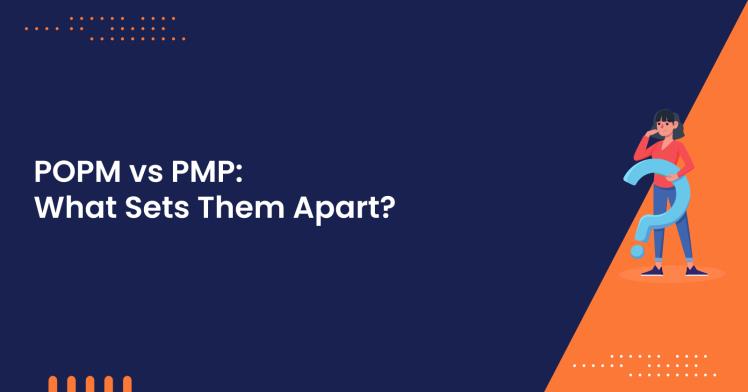POPM vs PMP: What Sets Them Apart?

In the ever-changing world of business and technology, professionals are always attempting to match their abilities to changing organizational demands. Two qualifications that frequently come up in this quest are POPM (SAFe® Product Owner/Product Manager) and PMP (Project Management Professional). They appear to be similar in terms of leadership, planning, and delivery, yet they differ fundamentally in emphasis, structure, and application.
This article explores the fundamental difference between POPM and PMP, assisting you in determining which path is most suited to your professional goals.
Overview
The Project Management Institute (PMI) offers the globally recognized PMP (Project Management Professional) credential. It attests to a project manager’s proficiency with project management concepts, procedures, and techniques and shows that they can successfully oversee projects.
POPM stands for Product Owner/Product Manager is a Scaled Agile Framework (SAFe) certification that assists businesses in implementing agile at scale. Product Manager and Product Owner responsibilities in a SAFe are the main emphasis of the certification. It addresses the tactical components of these positions, such as overseeing the Program Backlog, coordinating with business goals, and guaranteeing the Agile Release Train (ART) is carried out efficiently.
Core Focus: Project vs Product
The fundamentals of POPM and PMP between certifications is what sets them apart.
The SAFe POPM certification is focused on product management and ownership in the Agile environment. A product is a long-term outcome or service that is specified and given to a market, and may evolve over time.
Whereas, the PMP focuses on project management, which involves the scope and lifetime of a project are fundamentally different from those of a product. A project is a short-term activity with a defined start and end date that aims to produce a one-of-a-kind product or service.
Methodology and Framework
POPM is very well aligned with SAFe (Scaled Agile Framework). It focuses on Agile Release Trains (ARTs), lean budgeting, customer-centric development, and agnostic team collaboration. The certification enables the practitioner to operate in an Agile-at-scale environment, which is increasingly common in large organizations that are involved in digital transformation.
The PMP has traditionally been associated with the Waterfall paradigm. However, recent changes to PMBOK and the addition of Agile and hybrid methods show that PMI is evolving. PMP certification offers a flexible tool set, keeping it suitable across various industrial and project applications.
Skills and Knowledge Areas
The PMP curriculum contains extensive project management abilities, such as:
- Manage scope, time, cost, and quality.
- Procurement and Communication Management
- Effective team leadership and dispute resolution may be achieved using tools like Gantt charts, Work Breakdown Structures (WBS), and Earned Value Management (EVM).
- Risk and stakeholder management.
The POPM certification is focused on skills such as:
- Agile thinking and lean product development
- prioritizing backlogs and defining product features
- Understanding client requirements with feedback loops
- Participating in Program Increment (PI) Planning
- collaborating with Agile teams to deliver value iteratively.
Career Opportunities and Salary Potential
POPM & PMP, both certifications are highly recognized and may considerably provide you great career growth. However, their roles and responsibilities vary by sector and job.
The need for POPM-certified professionals is increasing highly in areas such as technology, finance, telecommunications, and healthcare, where Agile techniques are being implemented across the businesses.
PMP is still relevant in traditional industrial and project-oriented enterprises. This certification is mainly necessary for Director of Project Management roles and management positions in the Project Management Office (PMO).
Conclusion
Although the skillset of POPM and PMP may seem similar, the objectives, process, and application are entirely different. POPM is ideal for those who are looking for the role of product ownership and Agile value delivery, and PMP is more relevant for those who categorize themselves in managing complex projects under constraints.
Know what sets them apart, and make an informed decision on what certification best align with your professional goal and organisational needs and the industry you are working for.



